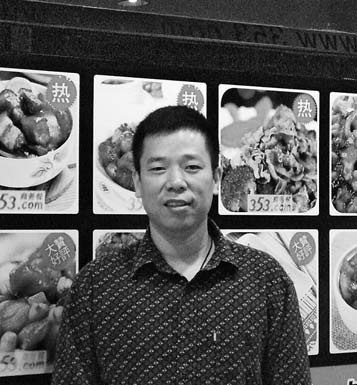'I will adapt,' says owner of stall that keeps bellies of techies full
 |
|
Yan Xihai from Xi'an, Shaanxi province, runs a food business in Zhongguancun that has made him a fortune. Zhang Yue / China Daily |
Yan Xihai started cooking at an eatery in Beijing's Zhongguancun in 1994 because it meant he wouldn't have to sleep under overpasses anymore.
The 36-year-old from near Shaanxi's provincial capital Xi'an was offered three meals a day and could sleep on the dining area's floor in exchange for his labor. Yan now runs a restaurant in the basement of a Zhongguancun office building that serves about 500 customers in the dining area, while also supplying 300 online meal delivery orders a day. His business earned about 3,000 yuan ($469) a day when it opened in 2003 and now rakes in 10,000 yuan.
"My friends joke I can't get out of the village," Yan says, laughing.
Cun means "village" in Mandarin. And that's exactly what Zhongguangcun was, when the man from rural Shaanxi came to the electronics market in the capital's northwestern corner. The patchwork of towers where electronics vendors and tech enterprises stand was then a quilt of vegetable fields.
"The first vendors here sold lunchboxes and vegetables," Yan says. "They learned from the electronics vendors and got rich quick."
Yan tried peddling gadgets but quit after half a year.
"It was too unfamiliar to me," he says.
"I like catering more. When I started my first food stand on the top floor of Hailong Building, it was so crowded that we avoided going downstairs. It was hard to get through the crush of people."
Yan's company expanded to all four of Zhongguancun's major market buildings. He owned 11 stands in 2008 but closed several because he believed the management of some markets was poor.
He took his catering service online to give his business an edge, he says.
"The homogenization of Zhongguancun's dining industry makes it as competitive as its electronics retailing," he says.
Yan started his online catering service with former Sina.com programmer Zhang Ling, who introduced the business model to the cook.
"It's e-commerce and has at least something to do with my former job," says Zhang, a native of Jiangsu province's Yangzhou city, whose elder brother works in Yan's restaurant.
"It's too difficult to operate my own company because several Internet tycoons have basically monopolized the market."
Yan says he "looks forward" to the transformation of Zhongguancun, in which Haidian district's government is clearing out half the unregulated gray market vendors.
"I am emotionally attached to Zhongguancun," Yan says. "My whole family lives here now."
He says he'll update the restaurant if the authorities follow through with the policy.
"No matter what the circumstances, I have to adapt."
















